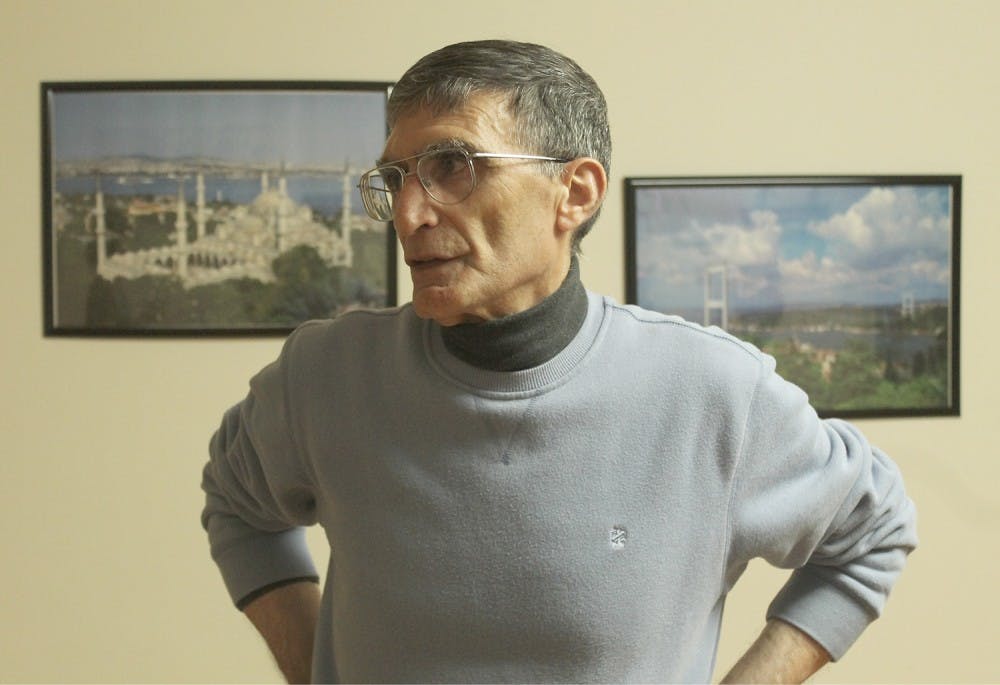“I had adjustment problems,” he said.
As he spent time in the states, he realized that many Americans knew little to nothing about Turkey besides what they had seen in movies like “Midnight Express” and “Lawrence of Arabia” — where the Turks were the bad guys.
“That’s their exposure,” he said. “And we have a thousand-year history.”
It was these two factors — knowing how difficult the transition can be and that Americans often do not have an accurate perception of Turks — that led him and his wife to establish a house in Chapel Hill for Turkish scholars. They call it the “Türk Evi,” which translates to the “Turk house.”
Both the American and Turkish flags fly from the front porch. Beside the door is a Carolina Blue octagon with the red Turkish emblem from the country’s flag.
The house is primarily designed to help scholars with adjustment, but there is no limit on how long they can stay. It has space for four residents, but only two live there now.
“Our desire is that after a year they move into the community,” Gwen Sancar said. “It’s designed to be a transition.”
Aziz Sancar has even greater hopes. The residents have been predominantly male, and because he believes in the value of women’s education, he wants to see more women move in.
“I want it to be a Turkish sorority,” he said.
The walls of one room of the Türk Evi are a testament to Aziz Sancar’s love for his country. A shelf holds several plaques from the Bridge to Türkiye Fund that thank him and his wife for various donations. Maps of Turkey and the Ottoman Empire. A picture of Mustafa Kemal Atatürk, the first Turkish president who did much to modernize Turkey after World War I.
Aziz Sancar traces the map of Turkey. There’s Istanbul, where he went to medical school, in the northwest. There’s his home in Mardin, in the southeast. He grew up close to the Syrian border. He said in the summer, he could sleep on the rooftop and see the Syrian lights.
He often speaks in low tones, but there’s a quality of deep concern when he speaks of Syria. He worries about the people he knows there. He worries about friends and family in Turkey.
To get the day's news and headlines in your inbox each morning, sign up for our email newsletters.
“We’re surrounded really by trouble,” he said. “And of course you worry about what’s going to happen.”
He speaks of how good the Syrian people are. He speaks of the tragedy happening so close to home.
“It’s a major source of...” he trails off. “I can’t explain it — pain for me.”
Those who have worked in his lab describe him as focused and driven. When he took a three-month sabbatical, he left a sign on his door that simply said, “Work hard.”
“If there’s two words that sum him up, it’s that,” said Michael Kemp, an associate professor and a member of Aziz Sancar’s lab.
But his drive seems to apply to how he cares for people as well. He speaks of how he wants to help Americans learn about Turks.
“Most conflicts, wars, et cetera, arise from not knowing one another,” he said. “If you know the other person, that’s a human being. We’re all the same.”
And he holds a special place in his heart for children. Though he and his wife have no children of their own, they do have goddaughters, and he makes a point to keep up with the children of his colleagues.
The bookshelf inside his office is marked with height measurements from some of the children of his colleagues, and their artwork congratulating him for the Nobel Prize hangs outside his door.
For years, Turkish journalists have written that he was the Turkish person closest to winning a Nobel Prize. He took that to heart.
“I think he felt it was important to help bring back Turkish pride because he still believes Turkey is a great country,” Gwen Sancar said.
After learning he had won a Nobel Prize, he told his wife he felt like a burden had been lifted from his shoulders. He is now the second Turkish person to win a Nobel Prize. It saddens him that so few from his country have achieved this distinction.
“It’s great to be acknowledged,” he said. “But we’ve not done our job as a country.”
university@dailytarheel.com



